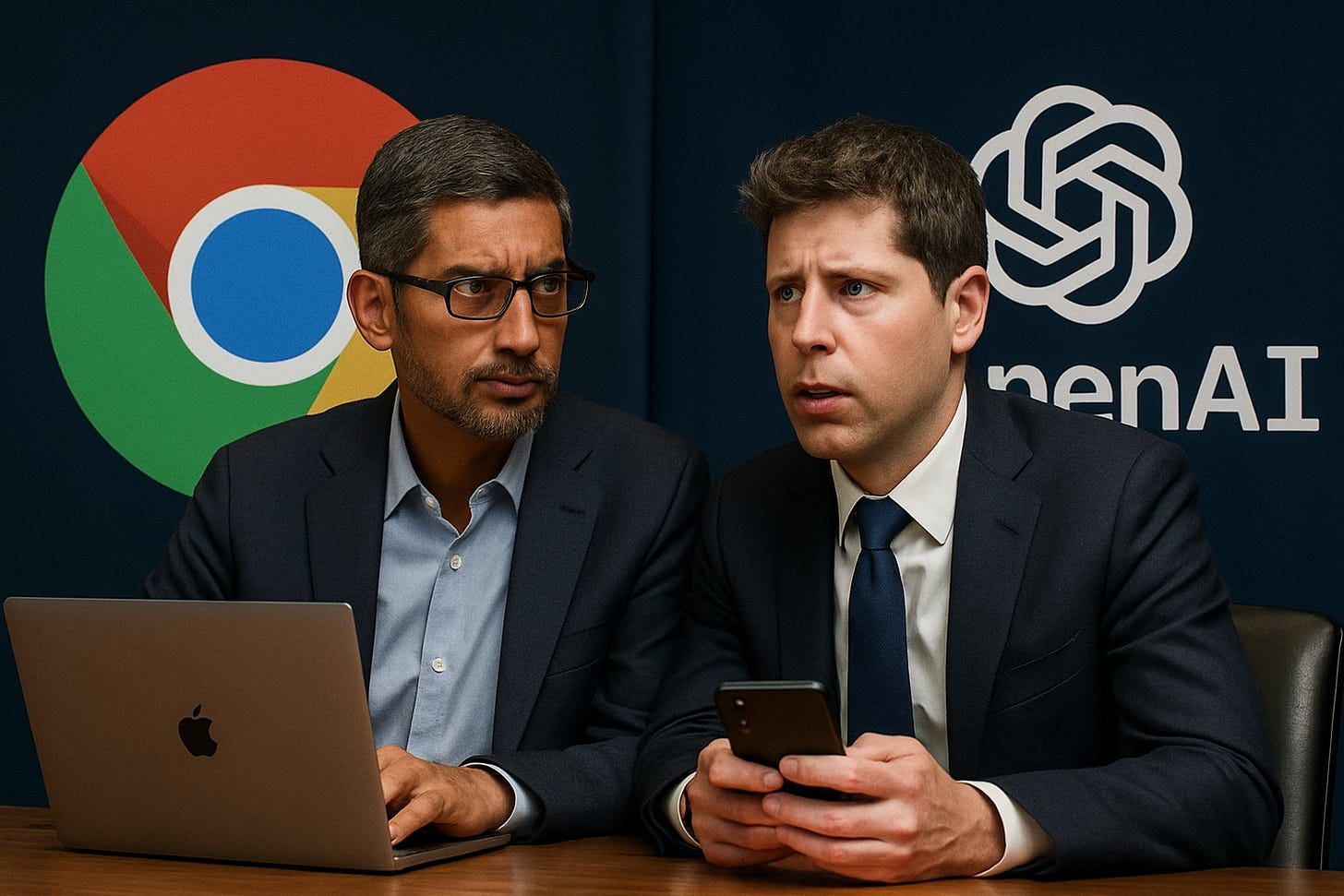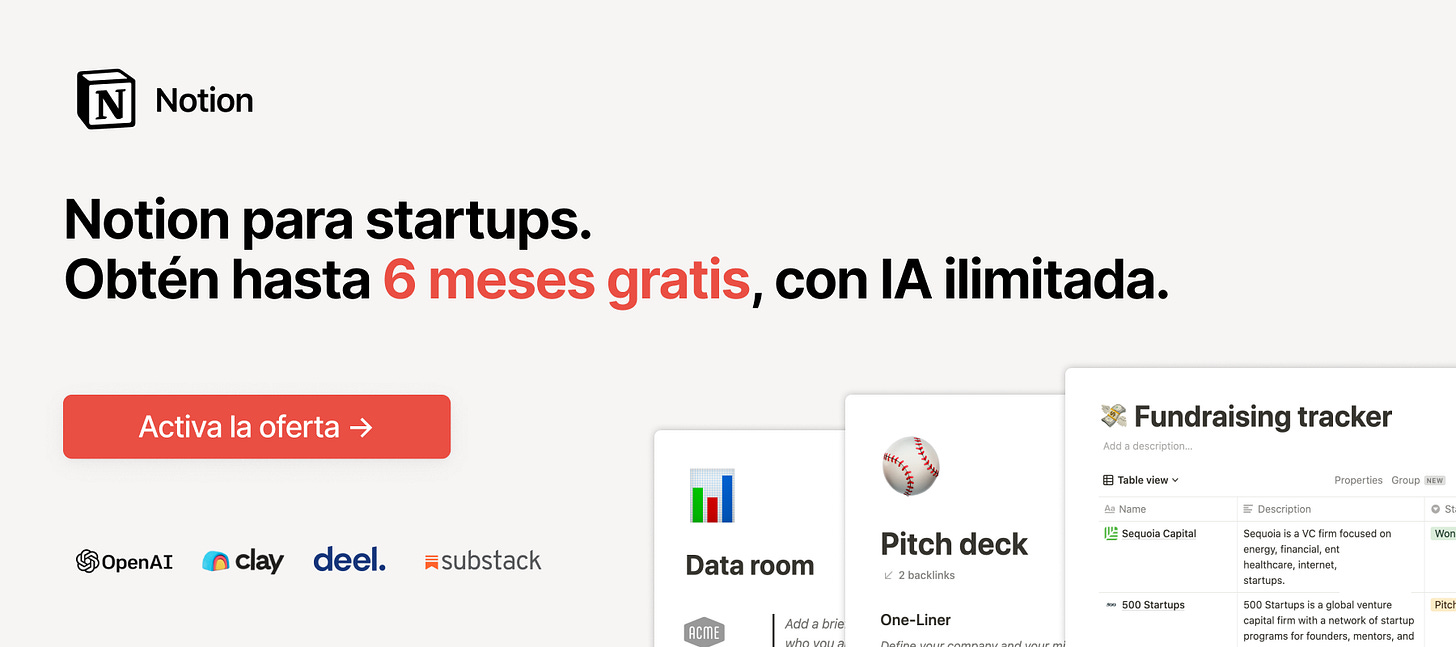🧠💸 OpenAI wants to buy Chrome and says being polite to its chatbot is expensive
🤯 OpenAI’s new models hallucinate more than ever… and there’s a reason for it 🙏💰 Saying “please” and “thank you” costs Sam Altman’s company millions each month
This week, OpenAI made it clear that it doesn’t just want to compete with Google—it wants to take its place in the global digital infrastructure. In a U.S. federal court, Nick Turley, Head of Product at ChatGPT, stated that the company would be willing to buy Chrome if the court forces Google to sell its browser as a remedy to restore competition. A surprising claim, but one that aligns with the moves Sam Altman and his team have been making.
Thousands of startups use Notion as a connected workspace to create and share documents, take notes, manage projects, and organize knowledge—all in one place. Notion now offers 6 months of the new Plus plan, with unlimited Notion AI included, so you can try everything for free!
The antitrust case against Google has entered the phase where corrective actions are being decided. One of the most controversial is the potential obligation to sell Chrome, which holds over 66% of the global browser market and serves as the main gateway to the internet for millions. For OpenAI, acquiring this tool would mark a strategic leap into a new era: AI-assisted browsing.
Turley explained that OpenAI had previously tried to collaborate with Google by offering to integrate its search API, but the proposal was rejected. “We currently have no agreement with Google,” he stated. Facing this roadblock, OpenAI chose a more direct path: developing its own browser with native ChatGPT integration and hiring former Google engineers like Ben Goodger and Darin Fisher to build an alternative ecosystem. Still, if Chrome is eventually put up for sale, acquiring it would be a too valuable opportunity to pass up.
Controlling the browser would open the door to mass distribution of ChatGPT—an ambition OpenAI has pursued since launching its AI-based search engine, SearchGPT. The browser could become the new default space for interacting with AI models, enabling conversational agents to perform tasks for users and learn from their browsing habits. “We could offer a truly incredible experience,” Turley emphasized.
Hallucinations in the new O3 and O4-mini models
As OpenAI advances toward dominating access to the web, an internal paradox emerges: its latest models, while more powerful, hallucinate more than ever. According to a technical report published by OpenAI and cited by TechCrunch, the O3 and O4-mini models outperform previous ones in reasoning capabilities—but also in generating errors. Specifically, O3 failed 33% of the time in PersonQA tests, while O4-mini reached 48%, doubling the error rate of earlier versions.
These “hallucinations” aren’t new—AI generates plausible but made-up answers when it lacks sufficient data. But the fact that this issue worsens with more advanced models is worrying. These errors might go unnoticed in casual settings but are risky when AI is used to summarize legal documents, draft reports, or assist in critical decision-making. So despite technical advances, human judgment remains irreplaceable.
Politeness with ChatGPT costs millions in energy and water
Another headline-grabber this week was the cost of digital politeness. A user asked Sam Altman, OpenAI’s CEO, if it was true that phrases like “thank you” and “please” make ChatGPT more expensive to use. His answer was both affirmative and revealing: “Tens of millions of dollars well spent,” he posted on X, defending the value of polite interaction—even with machines.
This cost isn’t metaphorical. Each message generated by a model like ChatGPT involves an inference process on servers equipped with high-performance GPUs like NVIDIA’s H100. These infrastructures consume vast amounts of electricity and water for cooling. More words mean more energy. And if millions of users add polite phrases to their messages, the accumulated impact turns into a multimillion-dollar energy bill.
That doesn’t mean we should stop being polite. In fact, a recent study on politeness and LLM performance showed that rude prompts tend to yield worse results. While excessive politeness doesn’t guarantee better answers either, the user’s tone undeniably shapes the model’s response—and with it, our perception of AI.
From Google’s monopoly to OpenAI’s?
The legal battle against Google might open a crack for change, but the competition among tech giants is rapidly reshaping the digital ecosystem. OpenAI’s case is telling: once a nonprofit, it now operates like a corporate powerhouse with hegemonic ambitions. Its recent hires, push to build proprietary infrastructure, and aim to control the gateways to information suggest it no longer seeks to merely participate—it wants to become the new gravitational center of the internet.
This desire for total control raises urgent questions. What happens if the browser, search engine, and assistant we use all belong to the same company? How is plurality in access to knowledge guaranteed? And what remains of the principle of technological neutrality? These questions are increasingly pressing in a sector where concentrated power has already triggered sanctions and lawsuits. But the real battle isn’t just in the courts—it unfolds in our everyday decisions: what we search for, who we ask, and how we interact. We’re at the dawn of a new era: the end of the internet as we knew it, and the beginning of the conversational age.



